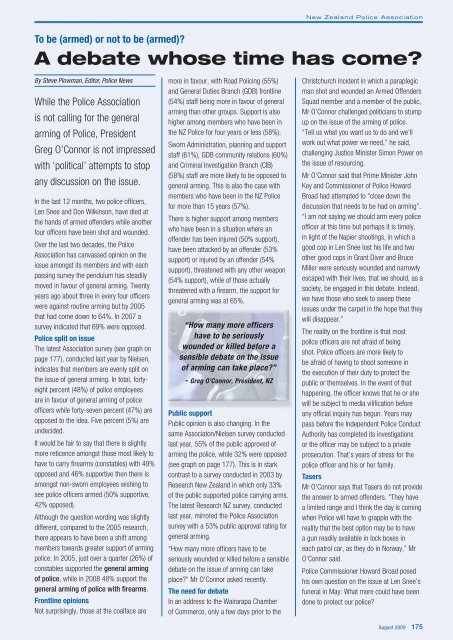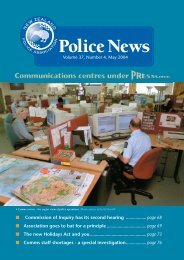Police News August 09.indd - New Zealand Police Association
Police News August 09.indd - New Zealand Police Association
Police News August 09.indd - New Zealand Police Association
You also want an ePaper? Increase the reach of your titles
YUMPU automatically turns print PDFs into web optimized ePapers that Google loves.
<strong>New</strong> <strong>Zealand</strong> <strong>Police</strong> <strong>Association</strong>To be (armed) or not to be (armed)?A debate whose time has come?By Steve Plowman, Editor, <strong>Police</strong> <strong><strong>New</strong>s</strong>While the <strong>Police</strong> <strong>Association</strong>is not calling for the generalarming of <strong>Police</strong>, PresidentGreg O’Connor is not impressedwith ‘political’ attempts to stopany discussion on the issue.In the last 12 months, two police officers,Len Snee and Don Wilkinson, have died atthe hands of armed offenders while anotherfour officers have been shot and wounded.Over the last two decades, the <strong>Police</strong><strong>Association</strong> has canvassed opinion on theissue amongst its members and with eachpassing survey the pendulum has steadilymoved in favour of general arming. Twentyyears ago about three in every four officerswere against routine arming but by 2005that had come down to 64%. In 2007 asurvey indicated that 69% were opposed.<strong>Police</strong> split on issueThe latest <strong>Association</strong> survey (see graph onpage 177), conducted last year by Nielsen,indicates that members are evenly split onthe issue of general arming. In total, fortyeightpercent (48%) of police employeesare in favour of general arming of policeofficers while forty-seven percent (47%) areopposed to the idea. Five percent (5%) areundecided.It would be fair to say that there is slightlymore reticence amongst those most likely tohave to carry firearms (constables) with 49%opposed and 46% supportive then there isamongst non-sworn employees wishing tosee police officers armed (50% supportive,42% opposed).Although the question wording was slightlydifferent, compared to the 2005 research,there appears to have been a shift amongmembers towards greater support of armingpolice. In 2005, just over a quarter (26%) ofconstables supported the general armingof police, while in 2008 48% support thegeneral arming of police with firearms.Frontline opinionsNot surprisingly, those at the coalface aremore in favour, with Road Policing (55%)and General Duties Branch (GDB) frontline(54%) staff being more in favour of generalarming than other groups. Support is alsohigher among members who have been inthe NZ <strong>Police</strong> for four years or less (58%).Sworn Administration, planning and supportstaff (61%), GDB community relations (60%)and Criminal Investigation Branch (CIB)(58%) staff are more likely to be opposed togeneral arming. This is also the case withmembers who have been in the NZ <strong>Police</strong>for more than 15 years (57%).There is higher support among memberswho have been in a situation where anoffender has been injured (50% support),have been attacked by an offender (53%support) or injured by an offender (54%support), threatened with any other weapon(54% support), while of those actuallythreatened with a firearm, the support forgeneral arming was at 65%.“How many more officershave to be seriouslywounded or killed before asensible debate on the issueof arming can take place?”- Greg O’Connor, President, NZPublic supportPublic opinion is also changing. In thesame Associaton/Nielsen survey conductedlast year, 55% of the public approved ofarming the police, while 32% were opposed(see graph on page 177). This is in starkcontrast to a survey conducted in 2003 byResearch <strong>New</strong> <strong>Zealand</strong> in which only 33%of the public supported police carrying arms.The latest Research NZ survey, conductedlast year, mirrored the <strong>Police</strong> <strong>Association</strong>survey with a 53% public approval rating forgeneral arming.“How many more officers have to beseriously wounded or killed before a sensibledebate on the issue of arming can takeplace?” Mr O’Connor asked recently.The need for debateIn an address to the Wairarapa Chamberof Commerce, only a few days prior to theChristchurch incident in which a paraplegicman shot and wounded an Armed OffendersSquad member and a member of the public,Mr O’Connor challenged politicians to stumpup on the issue of the arming of police.“Tell us what you want us to do and we’llwork out what power we need,” he said,challenging Justice Minister Simon Power onthe issue of resourcing.Mr O’Connor said that Prime Minister JohnKey and Commissioner of <strong>Police</strong> HowardBroad had attempted to “close down thediscussion that needs to be had on arming”.“I am not saying we should arm every policeofficer at this time but perhaps it is timely,in light of the Napier shootings, in which agood cop in Len Snee lost his life and twoother good cops in Grant Diver and BruceMiller were seriously wounded and narrowlyescaped with their lives, that we should, as asociety, be engaged in this debate. Instead,we have those who seek to sweep theseissues under the carpet in the hope that theywill disappear.”The reality on the frontline is that mostpolice officers are not afraid of beingshot. <strong>Police</strong> officers are more likely tobe afraid of having to shoot someone inthe execution of their duty to protect thepublic or themselves. In the event of thathappening, the officer knows that he or shewill be subject to media vilification beforeany official inquiry has begun. Years maypass before the Independent <strong>Police</strong> ConductAuthority has completed its investigationsor the officer may be subject to a privateprosecution. That’s years of stress for thepolice officer and his or her family.TasersMr O’Connor says that Tasers do not providethe answer to armed offenders. “They havea limited range and I think the day is comingwhen <strong>Police</strong> will have to grapple with thereality that the best option may be to havea gun readily available in lock boxes ineach patrol car, as they do in Norway,” MrO’Connor said.<strong>Police</strong> Commissioner Howard Broad posedhis own question on the issue at Len Snee’sfuneral in May: What more could have beendone to protect our police?<strong>August</strong> 2009175

















